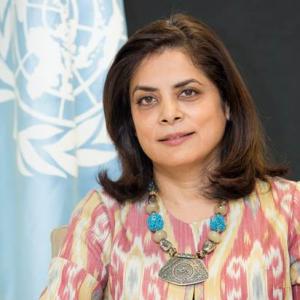Opening Remarks UN Resident Coordinator visit to the Better Work Initiative (BWI)
-
Selamat Pagi semua
Thank you for joining us today for our visit to the P.T. Ungaran Sari Garment factory.
I would like to begin by extending my appreciation to Pak Nur Arifin and his colleagues for giving us the opportunity to visit this factory and the various sites that we will be seeing today as part of ILO’s Better Work Initiative. My thanks to Ibu Michiko, ILO Director and our colleagues from ILO and UNIC for arranging this important visit.
In Indonesia, Better Work Initiative is focused on the garment industry, a critical industry for Indonesia, that contributes to 4% of Indonesia’s exports, employs 2.2 million people, 80% of whom are women and generates revenues of USD 8 billion a year. Indonesia recognizes this sector as job rich and a driver for inclusive growth and is keen to expand this sector.
Globally the UN engages the garment industry on achieving the 2030 Agenda through multiple forums, including the Alliance for Sustainable Fashion, which is committed to changing the path of fashion, reducing its negative environmental and social impacts; and turning fashion into a driver of the implementation of the Sustainable Development Goals (SDGs).
The fundamental premise of the Better Work programme is that by improving working conditions in garment factories, it will advance well-being, and boost competitiveness, profitability and productivity of garment enterprises. The programme recognizes that when it comes to poverty reduction, inclusive growth and sustainable development, the quality of jobs matters as much as the quantity and that a gender equal workplace is critical for business productivity.
Ladies and Gentlemen
I would like to focus my remarks on why we view the Better Work Initiative as a flagship initiative by the UN.
The Better Work programme represents a unique partnership at many different levels. At the global level, between the International Labour Organization (ILO) and the International Finance Corporation (IFC) bringing the expertise of the ILO in labour standards with that of the IFC in private sector development. Also at the global level, the Better Work programme has a partnership with 37 global companies/brands across 9 countries. At the country level, partnerships with relevant national and provincial Government authorities and at the factory level, partnerships between the management, workers and trade unions - 216 factories across 5 provinces in Java, Indonesia, with close to 400,000 workers, 80% of whom are women.
The programme has an interesting funding model – a combination of contributions from ILO’s global programme, grants from donors, contributions from the global brands and fees for services provided by the factories.
The programme works at different levels – at the policy/macro levels through policy advice and technical assistance to influence important legislation related to for example, social security, wages etc. At the micro (factory level), the programme conducts assessments to review compliance with labour laws, and provides tools, training and capacity development to empower women, end discrimination in the workplace and promote social dialogue among key stakeholders.
The programme facilitates South South collaboration and valuable knowledge exchange among the 9 countries participating in the progamme.
The programme has achieved important outcomes and results as evidenced by increased job stability and well-being, better working conditions including better access to maternal, reproductive and health care services, and an increase in productivity and profits.
In addition, the programme has generated several spin-off or multiplier impacts with creative bottom up solutions generated by the factories through social dialogue such as improved maternal and health care, a breast-feeding facility and a novel breast feeding courier service to transport breast milk to children, 90% of children remaining in school due improved well-being of families etc.
The programme contributes to multiple SDGs across the 2030 Agenda for Sustainable Development – Goal 8 related to Decent Work, but also Goals related to gender empowerment, health, nutrition, inequality and partnerships.
Programme sustainability has been considered through the creation of a Yayasan (NGO) with 30 enterprise advisors (former Better Work employees) that are providing technical advice/support to the participating factories.
I complement all the partners here for making this programme a success.
I would like to thank one of the donors to this programme, Pak Remy Duiven, Head of SECO, Swiss Government for being present with us today and thank all the other donors, Australia and Netherlands as well as the contributions coming from the factories, global brands and ILO’s Global Programme to this programme, both globally and here in Indonesia.
Once again, my sincere thanks to P.T. Ungaran Sari Garment factory, ILO and to you all for being here today with us and look forward to our site visits.
Terima Kasih Banyak
Speech by



